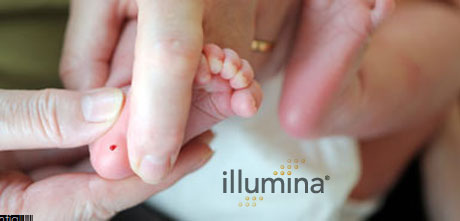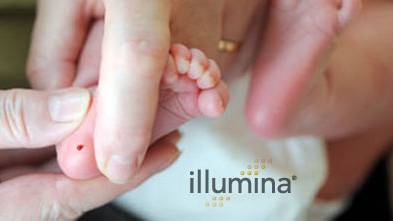Genetic mapping of babies by 2019 will transform preventive medicine
Source: timesonline.co.uk

Every baby born a decade from now will have its genetic code mapped at birth, the head of the world's leading genome sequencing company has predicted.
A complete DNA read-out for every newborn will be technically feasible and affordable in less than five years, promising a revolution in healthcare, says Jay Flatley, the chief executive of Illumina.
Only social and legal issues are likely to delay the era of “genome sequences”, or genetic profiles, for all. By 2019 it will have become routine to map infants' genes when they are born, Dr Flatley told The Times.
This will open a new approach to medicine, by which conditions such as diabetes and heart disease can be predicted and prevented and drugs prescribed more safely and effectively.
The development, however, will raise difficult questions about privacy and access to individuals' genetic records. Many people may be reluctant to have their genome read, for fear that the results could be used against them by an employer or insurance company.
The prospect of genome screening for all has emerged because of the plummeting cost of the relevant technology.
The Human Genome Project, which published its first rough sequence of mankind's genetic code in 2001, cost an estimated $4billion (£2.7billion). By the time the scientists James Watson and Craig Venter had their genomes mapped two years ago, the cost had fallen to about $1m (£700,000).
Genotyping services, which examine about 2million of the genome's 6billion DNA letters for clues to disease, are already available to consumers for about $1,000 (£700). Those with deeper pockets can have their whole genome mapped for about $100,000 (£70,000).
Illumina is preparing to launch a much cheaper whole-genome service within two years. It has already begun seeking consent from its first customers, who are likely to pay between $10,000 and $20,000 (£7,000-£14,000).
Last month, Illumina announced a deal with Oxford Nanopore, a British company that is developing a new approach to sequencing that could bring costs down further.
In an interview with The Times, Dr Flatley said a genome sequence should be available for less than $1,000 (£700) in three to four years.
“The limitations are sociological; when and where people think it can be applied, the concerns people have about misinformation and the background ethics questions.
“I think those are actually going to be the limits that push it out to a ten-year timeframe,” he added.
A baby's genome can be discovered at birth by a heel-prick blood test, similar to the one that is already used to screen for inherited diseases such as cystic fibrosis.
By examining which genetic variants a person has inherited, it is possible to identify raised risks of developing an array of conditions, including cardiovascular disease and many cancers. Those at high risk can then be screened more regularly, or given drugs or dietary advice to lower their chances of becoming ill.
As DNA affects the way certain drugs are metabolised, personal genomes could also be used to ensure that patients get the medicine that is most likely to work for them and least likely to have side-effects.
Personal genome sequencing, however, will raise legitimate concerns about privacy,
“Bad things can be done with the genome. It could predict something about someone — and you could potentially hand information to their employer or their insurance company,” said Dr Flatley. “Legislation has to be passed.”
Complete genetic privacy, however, was unlikely to be possible, he added.
“People have to recognise that this horse is out of the barn, and that your genome probably can't be protected, because everywhere you go you leave your genome behind.”
As the benefits become clearer, however, he believes that most people will want their genomes read and interpreted. The apparent benefits would soon eclipse the hazards.
Source: Genetic mapping of babies by 2019 will transform preventive medicine
More at the mtsarforum






















